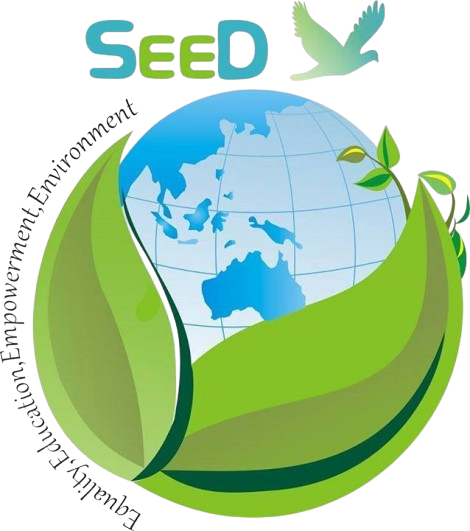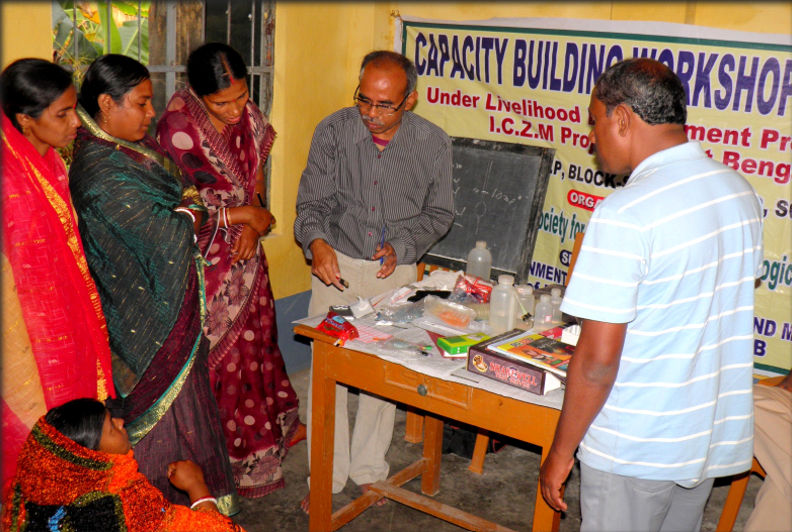






Sundarbans, West Bengal, where saline floods and cyclones regularly erase lives and livelihoods, a quiet revolution is underway. Led by women like Parbati Mandal, Tripti Jana and Bharati Bhuinya, this transformation is rewriting the story of survival into one of resilience and self-reliance—powered by SEED’s Climate-Smart Livelihoods programme.
Parbati’s Reselient Journey
Parbati Mandal, a 35-year-old homemaker, once risked her life daily catching fingerlings in crocodile-infested canals. Her family survived on her husband's inconsistent fishing income. Life was precarious, education for her children a distant dream.
Her turning point came when she joined a Self-Help Group (SHG) facilitated by SEED. Trained in poultry rearing, organic kitchen gardening, and financial literacy, Parbati learned not just new skills but how to navigate government schemes and demand entitlements. Today, she grows salt tolerent varieties of vegetables in her backyard and earns through backyard homestead poultry, sending both her children to school proudly. She's now a vocal advocate for women’s financial rights and often engages local panchayats to demand MNREGA work for her SHG members.
“I survived a crocodile attack. But now, I fight for my rights and my children’s future,” Parbati says, holding a basket of freshly harvested okra.”
Tripti Jana: A Tiger Widow Turned Resilient Earner
Tripti Jana’s husband was killed by a tiger while fishing—a common fate in Sundarban’s mangrove-dependent villages. Left with two children and no income, she struggled for years catching fingerlings in salt-impacted rivers, risking her health and life both.
Through SEED, she received training in water hyacinth crafting, katha stitching and access to small government schemes. Today, she earns steadily from selling her handmade products and MNREGA work.
“I lost my husband to the forest, but SEED showed me the way to stand on my feet again,” Tripti shares.
Bharati Bhuinya: From River Nets to Farm Nets
At 46, Bharati had faced more than her share of hardship—raising five children while fishing under the constant threat of tiger and crocodile attacks. Her husband, a day labourer, barely earned enough to support the family.
Through SEED’s training, Bharati now cultivates salt tolerant vegetables in her backyard. Her SHG not only earns but inspires. She plans to undergo advanced training in organic farming, aiming to mentor others.
“We used to live hand to mouth. Now, we eat better, save money and grow together,” she smiles.
Building Resilience from the Ground Up
Across the Sundarbans, SEED has touched the lives of 55,000+ vulnerable households through a suite of climate-adaptive livelihood models:
- Salt-tolerant paddy and vegetable cultivation in over 250 acres
- Livelihood diversification through poultry, goatery and piggery
- Craft-based microenterprises using water hyacinth and handloom revival
- Skill-building for SHGs, youth and Joint Liability Groups (JLGs)
- Community-led aquaculture and sustainable eco-tourism on climate-hit islands
A New Narrative
The success stories of Parbati, Tripti and Bharati represent more than personal triumphs—they reflect a growing community movement that is reclaiming agency in the face of climate collapse. Thanks to SEED and its dedicated partnerships with NABARD, World Bank, BPCL, Tiger Widows, Mahindra & Mahindra and others, the Sundarbans’ women are not just adapting—they are leading.
“We don’t just plant seeds in the soil—we plant hope,” says Bharati, as her SHG prepares for their next market day.



Subscribe to the SEED Newsletter — and be part of the change!